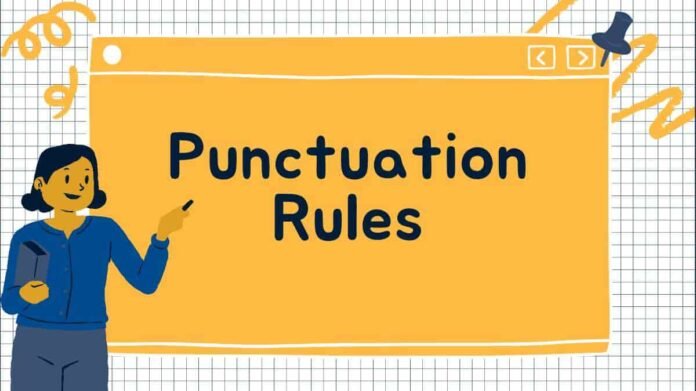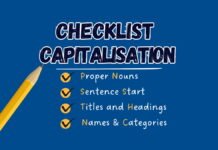Punctuation symbols are used to give sense to our spoken or written speech. They are used to structure and order your writing. Below are the most common punctuation rules.
1. Period or full stop in British English ( . )
- At the end of an affirmative sentence.
- Rabat is the capital of Morocco.
- Tom lives in London.
- With abbreviations like Mr. Mrs. Dr.
- Mr. John is my English teacher.
- Mrs. Barbara is our next-door neighbor.
2. Commas ( , )
- To separate a group of words (nouns, verbs, adjectives, adverbs…) in a sentence.
- Tom, John, Bill, and Joe are friends.
- To separate a group of words, clauses, or phrases in a sentence.
- I woke up, showered, ate breakfast, and went to school.
- Tag questions
- She speaks English, doesn’t she?
- We don’t have classes today, do we?
3. Semicolons ( ; )
- A semicolon is used interchangeably with a colon and a comma to separate independent clauses or a group of items when they contain commas as punctuation.
- She didn’t have many qualities; nevertheless, she was accepted for the job.
- There are two ways to write: with a pen or pencil, which is inexpensive and easily accessible, or by computer and printer, which is more expensive but quick and neat.
4. Colon ( : )
- It is used to introduce a list or explain whatever before it.
- Some of his hobbies are: reading, jogging, and surfing the net.
5. The exclamation mark ( ! )
- It is used to express surprise or to insist on a comment or short, snappy phrase.
- What a wonderful scene!
- Oh! How beautiful this little girl is!
- Help! Help! Please.
- I just can’t believe it!
6. The question mark ( ? )
- It is clear from its name we use it for questions.
- Where are you from?
- Can I take this?
- Did you visit England before?
7. The quotation mark ( “….” )
- They are used in direct speech to cite someone’s speech exactly.
- “Don’t forget to revise your lesson,” said the teacher.
- Lina: “I just love Eglish.”
8. The apostrophe ( ‘ )
- It is used to show possession and contraction (short form).
- This car is John’s. (possession).
- She can’t bear the noise. (contraction of cannot).
- We’ll have a test next week. (contraction of we will.
9. The hyphen ( – )
- It is used with compound adjectives.
- A five-dollar hotel.
- He is a well-known writer.
10. The dash ( — )
- It is the long form of the hyphen. It is used to emphasize the meaning of a sentence.
- You probably think he will be late — He will not.
11. Parentheses ( )
- They have the same function as commas when we want to give more explanation.
- I visited Marrakesh (which was full of tourists) on my way to Atlas Mountain for a hiking trip.
12. Ellipsis (…)
We use it to indicate omitted words or a pause in speech.
- “To be continued…”
13. Square brackets ([])
They are used to enclose explanatory or qualifying material that is not essential to the sentence’s meaning, especially when quoting text.
- “She went to the store [yesterday] to buy some groceries.”
Advertisement




Thank vert match
Welcome Mohammed